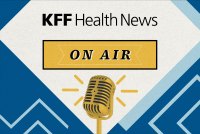Latest KFF Health News Stories
Watch: 5th Circuit Judges Question Two-Decade-Old Approval of Abortion Pill
The 5th Circuit Court of Appeals in New Orleans heard oral arguments Wednesday in a case brought by conservative Christian abortion opponents seeking to revoke FDA approval of mifepristone, a medication used in more than half of abortions in the U.S.
What the Health? From KFF Health News: The Crisis Is Officially Ending, but Covid Confusion Lives On
The public health emergency declaration for covid-19 ends May 11, ushering in major changes in how Americans can access and pay for the vaccines, treatments, and tests particular to the culprit coronavirus. But not everyone will experience the same changes, creating a confusing patchwork of coverage — not unlike health coverage for other diseases. Meanwhile, outside advisers to the FDA formally recommended allowing a birth control pill to be sold without a prescription. If the FDA follows the recommendation, it would represent the first over-the-counter form of hormonal contraception. Margot Sanger-Katz of The New York Times, Tami Luhby of CNN, and Joanne Kenen of the Johns Hopkins Bloomberg School of Public Health and Politico join KFF Health News’ Julie Rovner to discuss these issues and more. Plus for “extra credit” the panelists suggest health policy stories they read this week they think you should read, too.
Marihuana legal es más potente que nunca pero no está bien regulada
Cientos de miles de personas llegan a salas de emergencias por crisis relacionadas con la marihuana, y millones sufren trastornos psicológicos vinculados al consumo de cannabis, según investigaciones federales.
Legal Pot Is More Potent Than Ever — And Still Largely Unregulated
As marijuana has become far more mainstream, potent, and sometimes dangerous, uneven regulation at the state and federal levels leaves consumers at risk.
Federal Rules Don’t Require Period Product Ingredients on Packaging Labels. States Are Stepping In.
New York and California have passed laws requiring disclosure of ingredients on menstrual product packaging. Advocates want more transparency across the U.S.
Listen: Mifepristone Remains Available for Now. What Happens Next?
The Supreme Court on April 21 ruled that the abortion pill mifepristone should remain widely available while the lower courts consider the issue, blocking earlier rulings that banned or restricted access to the drug. KFF Health News’ Julie Rovner joined NPR’s “Weekend All Things Considered” to discuss the complicated case.
Redes sociales alimentan obsesión por las drogas para bajar de peso, sin hablar de riesgos
La competencia para hacerse con un mercado que podría valer $100.000 millones al año, solo para los fabricantes de medicamentos, ha desencadenado una ola de publicidad que preocupa a las autoridades sanitarias y médicos de todo el mundo.
Social Media Is Fueling Enthusiasm for New Weight Loss Drugs. Are Regulators Watching?
Online platforms are overflowing with testimonials for GLP-1s. The drugs show promise for inducing weight loss, but many aren’t FDA-approved for that use.
What the Health? From KFF Health News: The Confusing Fate of the Abortion Pill
The legality and availability of the abortion pill mifepristone is in question after a federal judge in Texas canceled the FDA’s approval of the first drug used in the two-drug medication abortion regimen. A 5th Circuit Court of Appeals panel overruled that decision in part, saying the pill should remain available, but only under the onerous restrictions in place before 2016. Meanwhile, another federal judge in Washington state issued a ruling in a separate case that conflicts with the Texas decision, ordering the FDA not to roll back any of its restrictions on the drug. Victoria Knight of Axios, Shefali Luthra of The 19th, and Sarah Karlin-Smith of the Pink Sheet join KFF Health News chief Washington correspondent Julie Rovner to discuss these issues and more.
Doctors’ Lesson for Drug Industry: Abortion Wars Are Dangerous to Ignore
The American Medical Association ducked the abortion issue for years and now sees its members’ professional opinions second-guessed by lawmakers and judges. PhRMA is following the same playbook.
FDA Evaluates ‘Safety Concerns’ Over Dental Devices Featured in KHN-CBS Investigation
A KHN and CBS News investigation found that a dental appliance called the AGGA has been used by more than 10,000 patients, and multiple lawsuits allege it has caused grievous harm to patients.
What the Health? From KFF Health News: A Judicial Body Blow to the ACA
A federal judge in Texas has dealt a big setback to the Affordable Care Act. The same judge who tried in 2018 to declare the entire ACA unconstitutional has now ruled that the law’s main provisions for preventive care are unconstitutional and, therefore, unenforceable nationwide. Also this week, North Carolina became the 40th state to expand Medicaid under the ACA. Alice Miranda Ollstein of Politico, Rachel Cohrs of Stat, and Sandhya Raman of CQ Roll Call join KHN chief Washington correspondent Julie Rovner to discuss these issues and more.
Judge Signals He Could Rule to Halt Sales of Common Abortion Pill
A U.S. District Court case is being widely followed because the judge’s decision could overturn the FDA’s approval of mifepristone two decades ago. With abortion rights polling well even in red states, anti-abortion activists are increasingly turning to the courts to achieve their aims.
FDA Looks Into Dental Device After KHN-CBS News Investigation of Patient Harm
The FDA’s interest in the AGGA dental device follows a KHN-CBS News investigation, according to a former agency official.
Envíos ilegales de medicamentos por correo no son de opioides. Muchos contienen Viagra genérico
Los funcionarios de la FDA afirman que los medicamentos comprados en farmacias extranjeras tienen 10 veces más probabilidades de ser falsificados que los vendidos en Estados Unidos.
Despite Pharma Claims, Illicit Drug Shipments to US Aren’t Full of Opioids. It’s Generic Viagra.
The FDA has long blocked the importation of cheap medicine, agreeing with pharmaceutical manufacturers that it opens the door to opioids. The agency’s own data shows that rarely happens.
What the Health? From KFF Health News: March Medicaid Madness
President Joe Biden and Republicans in Congress spent last month sparring over whether to shield Medicare and Social Security from budget cuts — leading some to wonder if Medicaid was on the table instead. Biden and Democrats say no, but some Republicans seem eager to trim federal spending on the health program for Americans with low incomes. And ready or not, artificial intelligence is coming to medical care. Benefits, as well as unintended consequences, are likely. Alice Miranda Ollstein of Politico, Rachel Cohrs of STAT News, and Lauren Weber of The Washington Post join KHN’s chief Washington correspondent, Julie Rovner, to discuss these issues and more.
One Texas Judge Will Decide Fate of Abortion Pill Used by Millions of American Women
“What happens in Texas doesn’t stay in Texas,” warns an abortion rights advocate bracing for a district judge’s ruling on whether the abortion pill mifepristone was properly authorized by the FDA. His decision could force the medication off the U.S. market.
A Bitter Battle Over the ‘Orphan Drug’ Program Leaves Patients’ Pocketbooks at Risk
Patients who depend upon special drugs to treat rare diseases are caught in the crossfire as drugmakers and the FDA battle over regulations that reward companies for developing treatments for relatively small pools of patients.
What the Health? From KFF Health News: A Health-Heavy State of the Union
President Joe Biden’s 2023 State of the Union address leaned heavily on health care issues. Biden took a victory lap for recent accomplishments like capping prescription drug costs for seniors on Medicare. He also urged Congress to make permanent the boosted premium subsidies under the Affordable Care Act, and he sparred with Republicans on threats to cut Social Security and Medicare. Also this week, both sides in the abortion debate are bracing for a court decision out of Texas that could, at least temporarily, make the abortion pill mifepristone illegal nationwide. Alice Miranda Ollstein of Politico, Rachel Cohrs of Stat, and Sarah Karlin-Smith of the Pink Sheet join KHN chief Washington correspondent Julie Rovner to discuss these issues and more. Also this week, Rovner interviews Kate Baicker of the University of Chicago about a possible middle ground in the effort to get universal health insurance coverage.




















